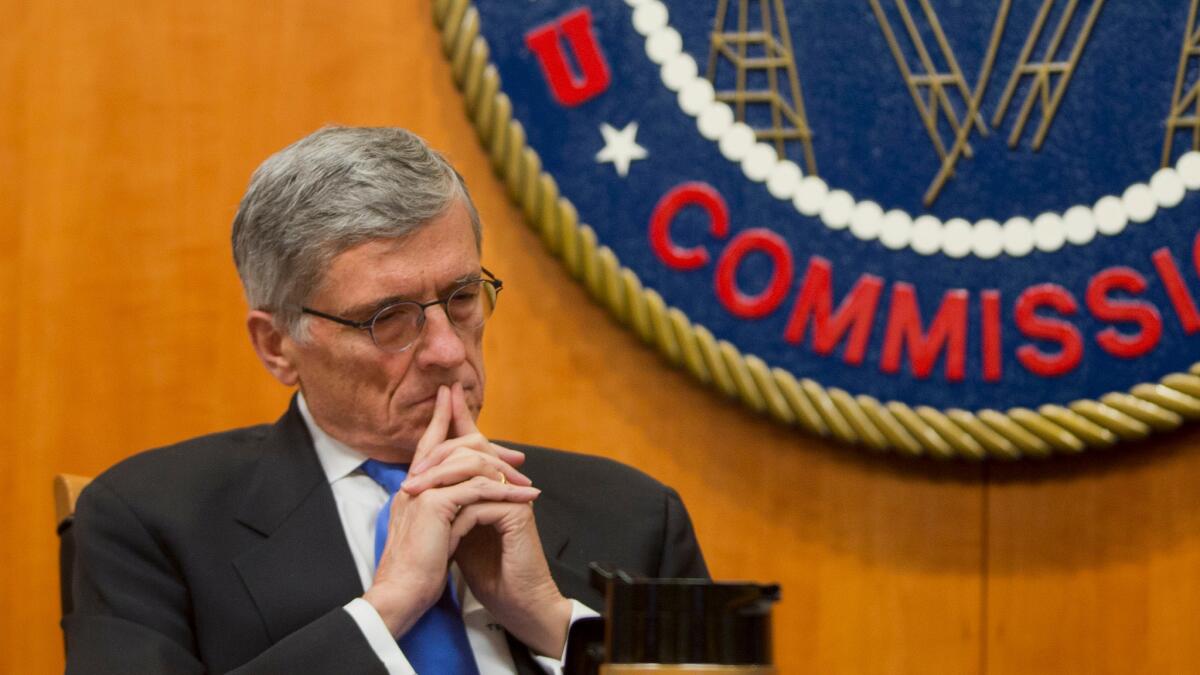Editorial: Saving the Internet from the whims of service providers

Federal Communications Commission (FCC) Chairman Tom Wheeler listens to commissioners speak prior to a vote on Net Neutrality in Washington, D.C. in 2015.
- Share via
The Federal Communications Commission has taken three different approaches to guarding the Internet against meddling by Comcast, Verizon and other Internet service providers that control its gateways. The first two were thrown out by the D.C. Circuit Court of Appeals, which held that the commission’s actions weren’t supported by federal law.
On Monday, a three-judge panel on the D.C. Circuit gave its blessing to the FCC’s latest and most controversial net neutrality regulations, which extend to broadband some of the same rules applied to local telephone monopolies. Internet providers howled and pledged to appeal, but the court’s ruling was a well-reasoned acknowledgment that a broadband connection has become the phone line of the 21st century.
The FCC’s “open Internet” rules, like the commission’s previous efforts to protect net neutrality, were designed to keep broadband Internet providers from warping competition among websites, apps and online services by barring the ISPs from playing favorites as they direct data to and from their customers. The goal, and it’s a crucially important one, is to make sure Internet users remain the ones deciding what content and services succeed and fail online. Otherwise, the risk is that deep-pocketed companies and entrenched online services will team up with Internet providers to squelch competition and block innovation.
The D.C. Circuit had blocked the FCC’s last net neutrality order in 2014 because it conflicted with the commission’s decision more than a decade ago to classify broadband as a lightly regulated “information service.” So the commission adopted rules last year that reclassified broadband as a “telecommunications service” — something that transfers information chosen by the user to a point chosen by the user, akin to a phone line — and set strict prohibitions on Internet providers interfering with their customers’ traffic.
Critics complained that it made no sense to apply even an updated version of a decades-old regulatory structure to broadband. And it would be better if Congress amended the law to give the commission clear new authority to protect net neutrality without exposing Internet providers to a host of other rules. Congress wrote much of the law governing telecommunications services in the 1930s, and the last update came before broadband made its debut.
But Congress hasn’t acted, so that leaves the job of protecting net neutrality to the FCC. As the D.C. Circuit noted, Internet providers have both the incentive and the opportunity to make the Internet less open.
The panel was divided, with only two of the three judges supporting the commission’s rules. But all three agreed that the commission had the authority to reclassify broadband. As the FCC found, the public overwhelmingly sees broadband as today’s version of a telecommunications service, connecting people to an ever-growing universe of services and sites online. That universe isn’t shaped today by the whims and preferences of Internet service providers, nor should it be.
Follow the Opinion section on Twitter @latimesopinion or Facebook
More to Read
A cure for the common opinion
Get thought-provoking perspectives with our weekly newsletter.
You may occasionally receive promotional content from the Los Angeles Times.










